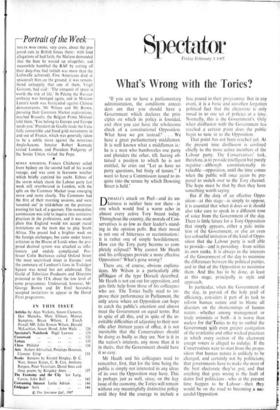What's Wrong with the Tories?
`If you are to have a parliamentary administration, the conditions antece- dent are that you should have a Government which declares the prin- ciples on which its policy is founded, and then you can have the wholesome check of a constitutional Opposition. What have we got instead? . . . We have a great parliamentary middleman. It is well known what a middleman is : he is a man who bamboozles one party and plunders the other, till, having ob- tained a position to which he is not entitled, he cries out "Let us have no party questions, but fixity of tenure." I want to have a Commission issued to in- quire into the tenure by which Downing Street is held.'
-1"-N ISRAELI'S attack on Peel—and its un- L./fairnesss is neither here nor there—is one which would find a warm echo in almost every active Tory breast today. Throughout the country, the morale of Con- servatives is as low as their leader's stand- ing in the opinion polls. But their mood is not one of bitterness or recrimination : it is rather one of simple bewilderment. How can the Tory party become so com- pletely eclipsed? Why cannot Mr Heath and his colleagues provide a more effective Opposition? What's gone wrong?
There are, of course, obvious explana- tions. Mr Wilson is a particularly able pithicjan of the type Disraeli described. Mr Heath is not cut out for opposition, and gets little help from those of his colleagues who are. The Tories badly need to im- prove their performance in Parliament, the only arena where an Opposition can hope to catch the public's attention and almost meet the Government on equal terms. But in spite of all this, and in spite of the in- evitable difficulties of adjusting to their new role after thirteen years of office, it is not inevitable that the Conservatives should be doing as badly as they are. Nor is it in the nation's interests, any more than it is in theirs, that the Government should have it so easy.
Mr Heath and his colleagues need to remember, first, that for the time being the public is simply not interested in any ideas of its own the Opposition may have. This is perhaps just as well, since, on the key issue of the economy, the Tories will remain without any meaningfully distinctive policy until they find the courage to include a free pound in their programme. But in any event, it is a basic and too-often forgotten political fact that the electorate is only tuned in to one set of policies at a time. Normally, this is the Government's. Only when disillusion with the Government has reached a certain point does the public begin to tune in to the Opposition.
That point has not been reached yet. At the present time disillusion is confined chiefly to the more active members of the Labour party. The Conservatives' task, therefore, is to provide intelligent but purely negative—although constitutionally in- valuable—opposition, until the time comes when the public will once again be pre- pared to switch over to the Tory channel. The hope must be that by then they have something worth saying.
But if the duty of an effective Oppo- sition—at this stage—is simply to oppose, it is essential that when it does so it should also take care to speak in a different tone of voice from the Government of the day. There is little future for a Tory Opposition that simply appears, either a pale imita- tion of the Government, or else an even less colourful imitation of the kind of Oppo- sition that the Labour party is well able to provide—and is providing—from within its own ranks. It is always in the interests of the Government of the day to minimise the differences between the political parties, and in that of the Opposition to maximise them. And this has to be done, at least at this stage, principally in style and approach.
In particular, when the Government of the day, in pursuit of the holy grail of efficiency, considers it part of its task to reform human nature and to blame all disasters on the shortcomings of human nature—whether among management or trade unionists or both—it is worse than useless for therories to try to outbid the Government With even greater castigation of the restrictive and other wicked practices in which every section of the electorate except voters is alleged to indulge. If the Conservatives were to start from the propo- sition that human nature is unlikely to be changed, and certainly not by politicians; that governments have to make the most of the best electorate they've got; and that anything that goes wrong is the fault of damn fool politicians—who at the present time happen to be Labour—then they would be on the road to becoming a suc- cessful Opposition.






























 Previous page
Previous page